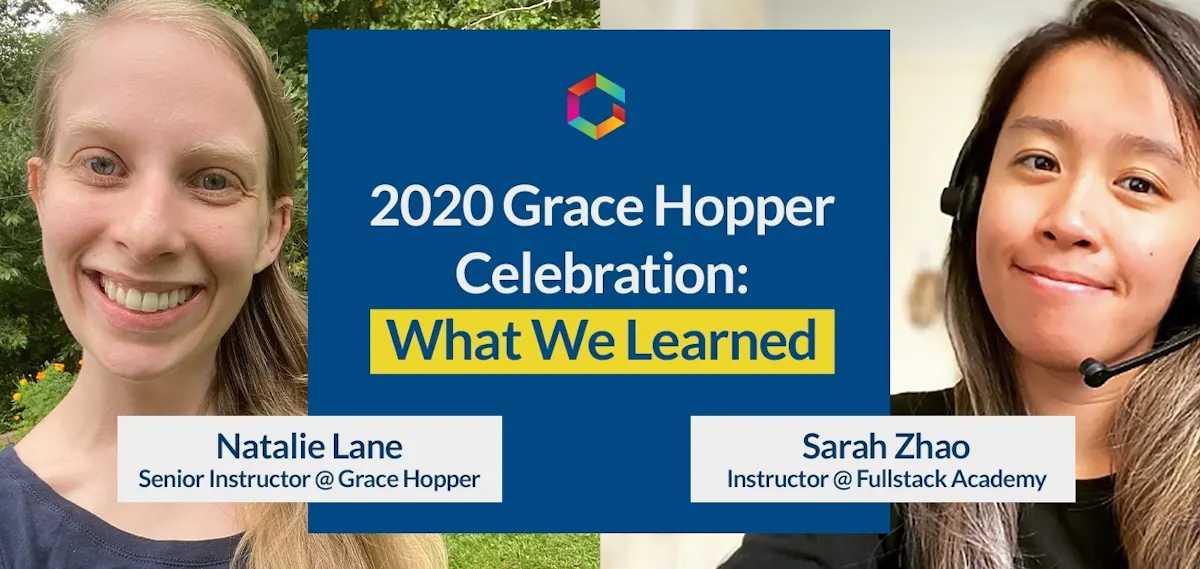Fill out the form to get more information about the Grace Hopper Program bootcamp of your choice.
03.20.2023
2020 Grace Hopper Celebration: What We Learned
By Emily Gregor

In addition to our project-based curriculum, what makes Fullstack and Grace Hopper stand out is our incredible instructional team.
"Our instructors are the lifeblood of our work at Fullstack Academy. We look for a unique combination of knowledge, skills, and abilities within both software engineering and teaching,” says Michele Cantos, Fullstack Academy’s Managing Director.
All of our instructors are software engineers and are experts in the field—some have even attended Fullstack and Grace Hopper themselves.
“We look for passionate technologists who can speak to the real-life joys and challenges of being a software engineer in the field and who also display experience and talent for teaching high-level concepts to beginners," Michele says.
Senior Instructor Ben Rodriguez agrees: “There are certain things that I believe constitute all of us as an instructor team: We love to teach; communicate thoughtfully, compassionately, and empathetically; we’re technically sound; and we’re adaptable, innovative, and know the stack.”
Beyond supporting our instructional team’s teaching initiatives, we encourage them to attend industry events like the annual Grace Hopper Celebration (GHC), produced by our friends at AnitaB.org, to sharpen their skills and network.
If you couldn’t make it to this year’s virtual conference, developers from the Google Cloud team have shared resources from their sessions, ranging from how to find a mentor in tech to exploring career paths and tips for women working in the industry.
Our Director of Academic Product and Instruction, Dan Sohval, led a workshop on numerical programming for 400 students (admittedly, the biggest class he’s ever taught). And they weren’t all just faces behind a Zoom screen either: The eager students asked thoughtful questions and left remarks in the chat such as “This was one of the most fun workshops I have attended yet!” and “I wish my professors in college taught like this.”
<
Keep reading to hear from Sarah Zhao, an Instructor at Fullstack Academy, and Natalie Lane, a Senior Instructor at Grace Hopper, about their experiences at the 2020 Grace Hopper Celebration and how the sessions they attended will influence their teaching.
Q: What does the Grace Hopper Celebration mean to you?
Sarah Zhao (SZ): The Grace Hopper Celebration is a reminder of the success and growth that womxn in tech have accomplished and will continue to accomplish, which we don't talk about enough.
Natalie Lane (NL): The first time I attended the Grace Hopper Celebration was as a student in college. I was so happy to be surrounded by so many people that I could relate to.
I still think about the talks and interviews that I had that week, as it was such a great opportunity early in my career to meet many influential women in technology.
While I was there I remembered thinking to myself, I really hope to get a job somewhere that would allow me to come back to this conference one day…. Fast-forward a few years later, and that wish came true!
Q: What was your favorite session?
NL: For the GHC 2020, I attended quite a few sessions, and one that really stuck out to me was Find Your Voice as a Code Reviewer by Alice Bonhomme-Biais and Kendra Curtis.
SZ: The Law of Nines: Designing your Service for High Availability presented by Sunitha Srivatsa.
Q: What’s something new that you learned?
SZ: I learned about the overarching concept of load shedding, which wraps up a few concepts I learned prior, including throttling limits for my APIs and forcing pagination to make scaling more testable and predictable.
NL: I learned a lot of great tips for how to better phrase and frame feedback that I give during code reviews—a task I do many times over a senior phase with students.
Specifically, I loved how they talked about phrasing feedback so that it's less personal such as “we should change this function” or “this method has a bug” rather than “you should change your function” or “your method has a bug.” I was shocked to learn that at one point code reviews were done on paper—can you imagine?!
Q: How will this session impact your teaching?
NL: I'm so excited to take the tips given to me at this session and use them to improve the entire code review experience for my students.
Thank you so much to Alice and Kendra for clearly laying out the best practices to follow for code reviews and for the always-needed reminder that imposter syndrome will sneak up on just about anyone regardless of whether they are the code reviewer or submitter! [ed note: Programmers are particularly at risk for imposter phenomenon because learning to program is so difficult.]
SZ: I think being provided more context about topics will always help me decide what terms and phrases and context I should provide to students, the same way that students always ask for more real-life use cases. This helps my teaching become more robust.
Next Steps
If you want to learn more about APIs, functions, and more, sign up for Bootcamp Prep to take the next step on your Road to Code. If you’re not sure what any of those terms mean, sign up for Intro to Coding.
Remember: All software engineers started where you are now, so just keep at it. We hope to see you in class soon!
Now that you’ve gotten to know some of our instructors, learn more about the Fullstack Experience and find out if a career in software engineering is right for you.


